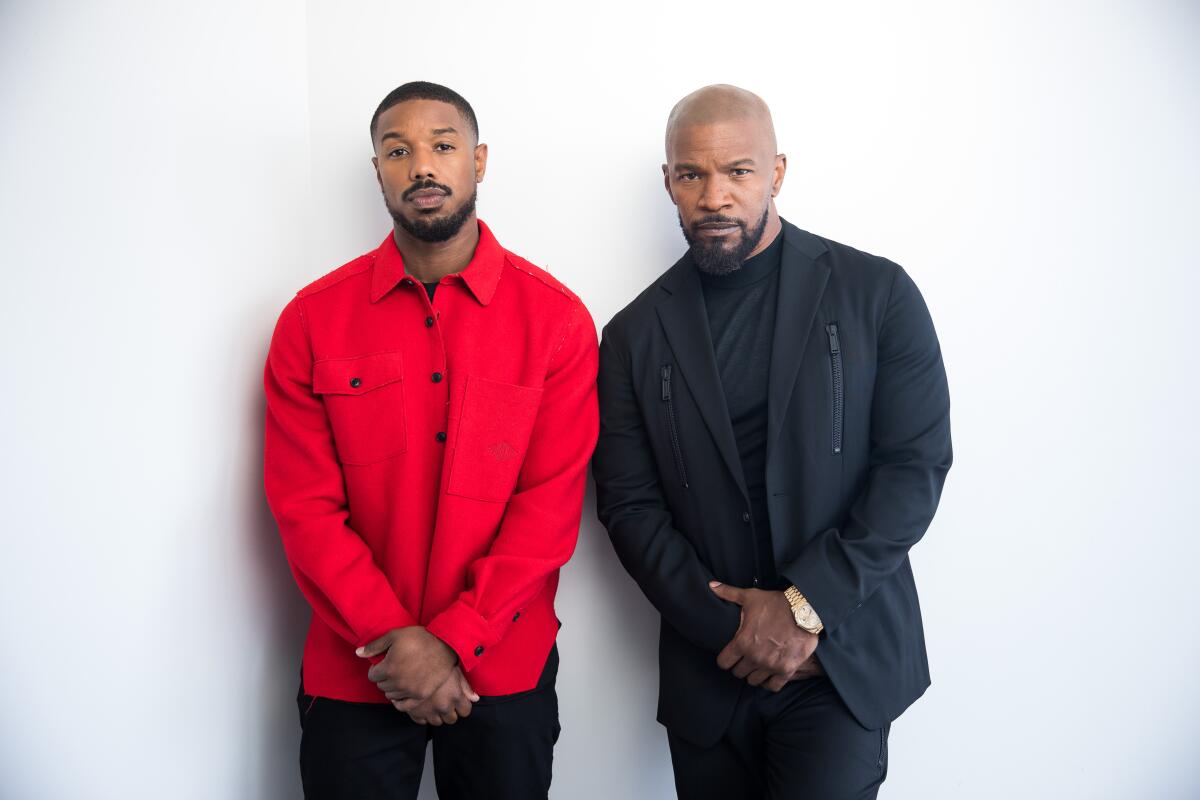Indie Focus: Alfre Woodard overwhelms in ‘Clemency’
Hello! I’m Mark Olsen. Welcome to another edition of your regular field guide to a world of Only Good Movies.
This week saw some midweek Christmas Day releases as well as regular Friday openings. So while we already featured Greta Gerwig’s “Little Women” in a previous newsletter, since then we’ve published Amy Kaufman’s interview with Gerwig.
The two of them walked among snow-covered locations of Concord, Mass., where “Little Women” author Louisa May Alcott lived. Gerwig toured the town and mentioned what it might have meant to her younger self that she would later adapt such a beloved and influential piece of literature.
“I think young Greta wouldn’t believe it,” Gerwig said. “I think she’d be proud that I found a voice as a writer and a filmmaker, and I found a way to get that into the world. I always wanted to but I wasn’t always certain that I could — that I was worthy of it. So I hope she’d be proud.”
As it happens, this week on our entertainment podcast “The Reel,” I spoke to Gerwig’s partner, Noah Baumbach, writer and director of “Marriage Story,” about his own film, a deeply emotional story about a couple coming apart.
“What can happen in a divorce is it sort of reveals the cracks in the foundation and cracks actually break open in a divorce,” Baumbach said. “I felt like there was that opportunity in a sense here that in telling the story of a marriage coming apart, I could actually focus even more clearly on the marriage itself, that it could be a story about marriage as much it was a story about divorce.”
This newsletter will be taking next week off. I don’t want to say the new releases will be unremarkable, but I am thankful for the timing of a post-holidays break. We will be back on Friday, Jan. 10, so let’s all promise ourselves to watch at least one movie we’ve been meaning to catch up on in the meantime.
For information on upcoming L.A. Times screenings and Q&A events, visit events.latimes.com/screenings.
‘Clemency’
Winner of the grand jury prize at the Sundance Film Festival, “Clemency” was written and directed by Chinonye Chukwu. In the film, Alfre Woodard gives a celebrated performance as a prison warden who oversees executions. The toll of her work slowly builds within her, seeming to crescendo around the story of a man who proclaims his innocence (Aldis Hodge, also magnificent) while seeking to avoid execution.
In a review for The Times, Justin Chang wrote that “‘Clemency,’ opening quietly in limited theatrical release amid bigger, noisier entertainments, deserves a wider audience than it’s likely to find: It’s a sterling piece of American realism, powered by the transfixing spectacle of a great actor at the peak of her powers.”
Lisa Rosen spoke to Woodard about her character and the poignant intensity of the film’s story. “It was a world I was completely ignorant of,” Woodard said. “I’m a grown-up woman, very grown-up, and I’m educated, and I’m politically aware and socially active since I was a teenager, so for me to go, ‘Whoa, I didn’t know these people existed’ — I figured if I didn’t know, the majority of people didn’t. It’s always another reason to go to work: There’s something to be told. And if there’s something where lives are in the balance, you always want to honor it.”
Reviewing the film for the New York Times, Manohla Dargis wrote about the harmony between Chinonye’s filmmaking and Woodard’s performance, which she said “gathers its astonishing force incrementally, in subtle choices and inflections that you might not even register as actorly decisions. When Bernadine first patrols the prison, you see a woman supremely in control, a professional whose casual authority informs her every gesture and whose absolute power has relaxed her posture, determined the rhythm of her gait, put an easy swing in her arms. That same power is what finally undoes Bernadine, a tragic figure whom Woodard brilliantly dismantles piece by ravaged piece, tearing apart a false front — and the larger institution this woman faithfully upheld — with unapologetic ferocity.”
Writing for the Undefeated, Soraya Nadia McDonald brought together “Clemency” and the death-row drama “Just Mercy” — more on that below. “If ‘Clemency’ is an examination of the toll of complicity, ‘Just Mercy’ is a journey into the psychic and spiritual rewards and pitfalls of fighting injustice. … Ultimately, both ‘Clemency’ and ‘Just Mercy’ continue the work of highlighting racial inequality in the justice system, leaving their viewers disturbed and impatient for change.”

‘Just Mercy’
Directed and cowritten by Destin Daniel Cretton, “Just Mercy” is based on the memoir of Bryan Stevenson, an attorney who has helped free more than 135 wrongly convicted death-row prisoners. Stevenson is played in the movie by Michael B. Jordan (also a coproducer on the project), as the story follows one of his earliest cases, working to exonerate Walter McMillian, played by Jamie Foxx, from a wrongful murder conviction. The cast also includes Brie Larson, Rob Morgan, Tim Blake Nelson and O’Shea Jackson Jr.
In a review for The Times, Kenneth Turan wrote that the film is more than a conventional biopic. “Rather, the film is at its most convincing when doing something more difficult: allowing us, emotionally, to feel the extent of the crisis Stevenson has made his life’s work. … As co-written by Cretton and Andrew Lanham based on Stevenson’s memoir, ‘Just Mercy’ calmly presents a world where entrenched racism, suffocating intimidation and an all but closed legal system stack the deck, to a terrifying extent, against impoverished defendants of color.”
Glenn Whipp spoke to Jordan and Foxx about the film. Just as filming began, Jordan began to suffer from extreme pain whose source would later be diagnosed as a slipped disc in his back but at the time remained mysterious. He recalled what a doctor who couldn’t find the problem told him: “Sometimes when you can’t diagnose something, that’s something God is putting on you.”
Foxx jumped on the idea, adding, “God put something on you, then you put it back on God, and when that happened, the movie came to life. You’re saying those incredible speeches in the courtroom, and you got a standing ovation from the extras who had tears in their eyes from your words.”
‘1917’
Based in part on stories from his grandfather, Sam Mendes directed and cowrote “1917.” Set during World War I in the spring of 1917, the film tells the story of two young British soldiers (George MacKay and Dean-Charles Chapman) who must go on a perilous journey to deliver a message that could save thousands of lives. And it is all constructed to appear as one seamless and unbroken shot.
In a review for The Times, Justin Chang wrote, “‘1917’ might be best approached not as a work of strict realism but as a knowing hybrid of authenticity and artifice. It’s worth recalling that Mendes is a longtime theater director, which may explain some of the movie’s more brazenly operatic gestures: In one stunning nighttime scene, Deakins’ camera rises over those fire-lit ruins, transforming a disaster zone into a stage as [Thomas] Newman’s score rises in a mighty crescendo. It may be a grandiose flourish, but you can’t deny it makes for a startlingly literal theater of war.”
Josh Rottenberg spoke to Mendes about the technical challenges of making the movie appear to unfold in a single long, continuous take. “I didn’t want it to feel ostentatious or gimmicky,” the director told him. “There aren’t many of us who have the energy to push this ... thing up the hill, but I think that for those of us who can, it’s important that we do. You know, we’ve built these palaces for ourselves. They’re comfortable, the sound is unbelievable, you’ve got huge screens and bells and whistles: IMAX, Dolby Vision, Dolby Atmos. Let’s use the damn things.”
Emily Zimler spoke to MacKay about the film’s complicated production. “Everyone had to work together for it to work,” he said. “That awareness of everyone’s job is like nothing I’ve seen on a film. I learned so much about everyone else’s jobs. Everyone was there together and the only great thing was the story.”
For Time, Stephanie Zacharek wrote, “Mendes knows what he’s doing. There are moments of horror and deep sorrow in ‘1917,’ including a scene of brutality followed by an aching loss — that this loss results from an act of compassion makes it even more cosmically cruel. This event occurs roughly a third of the way into the movie, and you feel its punch, hard. Yet Mendes’ aim isn’t to serve up relentless punishments for two hours. (The picture is just the right length for the story: You don’t need an epic runtime when your movie has an epic spirit.)”
Email me if you have questions, comments or suggestions, and follow me on Twitter: @IndieFocus.
More to Read
Only good movies
Get the Indie Focus newsletter, Mark Olsen's weekly guide to the world of cinema.
You may occasionally receive promotional content from the Los Angeles Times.











